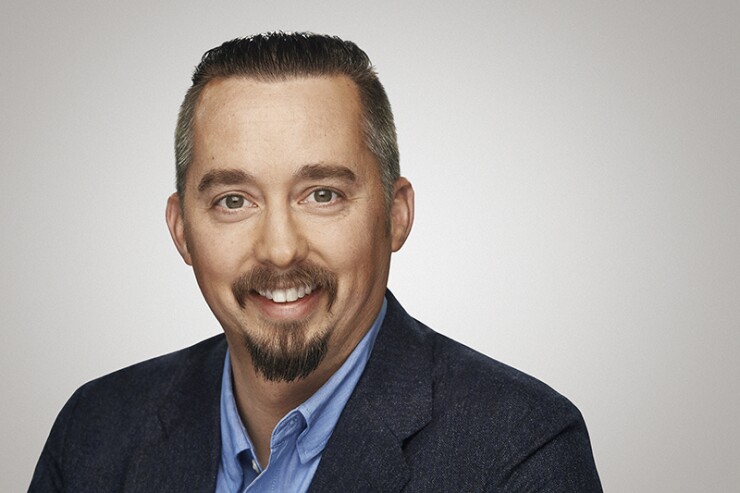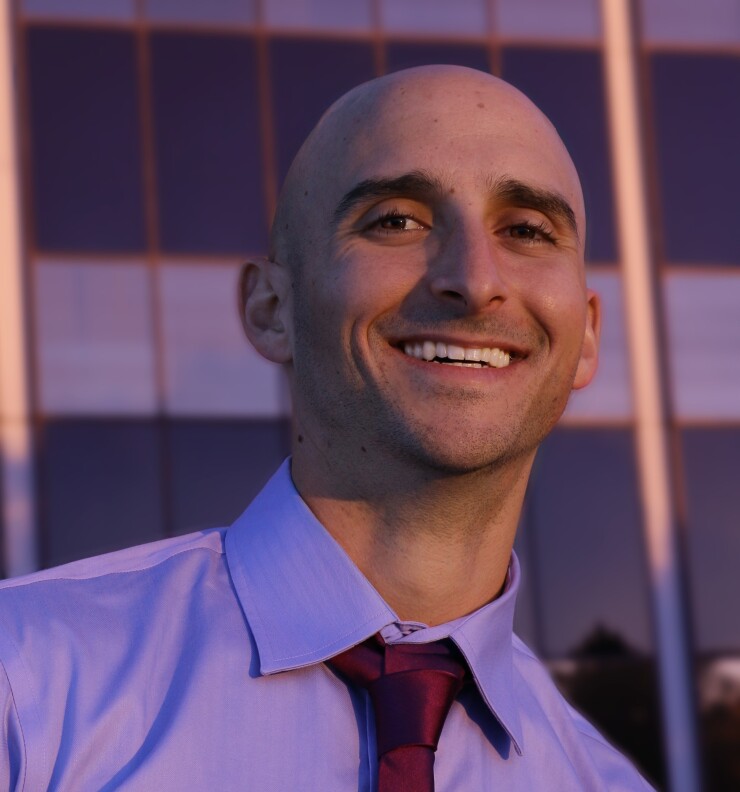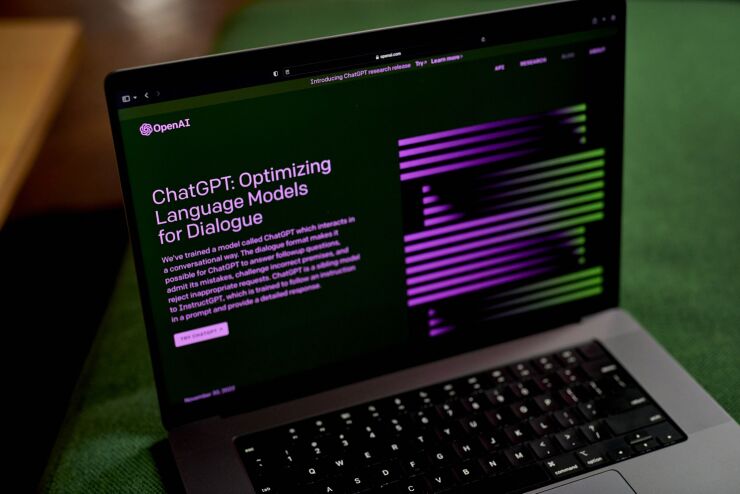It can help
It might even
So what long-term impact will
But replacing financial advisors? Out of the question. That's the answer veteran financial planner Reese Harper and many of his peers give when asked. It's also the answer
Harper said that's because what ChatGPT excels at — providing answers — isn't really what people hire financial advisors for in the first place.

Created by AI and research company OpenAI and unleashed upon the masses in November 2022, ChatGPT is AI-powered chatbot based on the GPT (Generative Pretrained Transformer) language model. With the help of deep learning techniques, the tool has the ability to generate conservational, human-like responses to text inputs.
"They're hiring a financial advisor for an emotional job, which is, 'I want to feel safe. I want to feel like I'm making the right decisions.' They're not hiring a financial advisor to give them answers to questions about generic information," Harper said. "They're hiring a financial advisor to give them the confidence to make decisions that are customized to their own data. If we use AI to violate that trust, then customers are not going to trust their advisors."
But the excitement around the tech is palpable and impossible to deny. While making clear that advisors will always trump AI, the
It's also something those investing in fintech startups are salivating over. Harper, coming off a capital raise during a difficult quarter, said investors repeatedly asked during pitches if his platform planned to leverage generative AI.
He pointed to the Austin, Texas-based AI content platform
"From that moment, every VC started calling me and asking, 'are you guys going to have anything with generative AI in your product?' It was kind of ridiculous," he said. "It was like a box that needed to be checked for about two months right before I started seeing it all over Twitter and seeing it all over email."
Still, it's difficult to determine exactly where ChatGPT and tools like it will settle into advisors' stacks. There are some significant problems upon closer inspection, much like
Right now, it's still being refined by the early adopters — folks brave enough to go all-in on ideas-turned-eventual flops like Google Stadia or the Amazon Fire Phone so that someone else can come along and get it right.
The big difference is that ChatGPT will undoubtedly get better. And better. And better again quickly. The speed of its evolution was something quipped about by FP Alpha CEO Andrew Altfest and T3 Founder Joel Bruckenstein
"You can't read the news without seeing ChatGPT and the buzz that it has created. I mean, the advances that we're seeing in AI are tremendous," Altfest said. "We all have to keep refreshing our value and investing in our serving clients so we don't fall behind."
And Bruckenstein, in an effort to explain just how quickly AI is improving, did so with a humorous real-life example involving another well-known name in wealthtech.
"I was at a conference about a month ago and
The people's choice?
In conversations with those in the wealthtech space, many are quick to point out that ChatGPT is not the first or only generative AI solution out there. But it is the one that managed to go mainstream, thanks largely to social media.
As such, the average American investor is quickly taking to the tech. According to a recent consumer survey conducted by Magnifi,
In general, the survey finds that 60% of Americans are optimistic about artificial intelligence. Of that total, 24% said they are excited for it to make their lives easier and better, and 36% said that it seems like it has the potential to improve their lives.
The survey also found that 41% of respondents would make an investment decision based on guidance from AI. Millennials (57%) and Generation Z (52%) are the most eager to use ChatGPT for investment advice.
But a third (34%) of respondents said they do not understand artificial intelligence and are either unsure about it (24%) or don't trust it (13%).

Tom Van Horn, chief product officer at Magnifi, told Financial Planning that he thinks the impact helps with the competence and adoption of this kind of technology in financial services and other sectors.
He adds that he feels like his firm got a bit of a head start on the AI graze of 2023 when they launched
Subscribers can chat with their assistant about questions like "How can I invest in the current market conditions?" or "What sectors performed best this month?" or "Compare Apple, Amazon, Tesla and Netflix" and immediately get the data and guidance needed.
"If I had to describe it, I'd say it's like ChatGPT and a financial advisor had a baby," Van Horn said. "So I think the more that conversational AI is in the marketplace, it feels more natural."
But AI's rise in the business world comes from a desire to get closer to customers, Van Horn said. In recent years, wealth managers have been searching for ways to interact with clients in a new landscape.
And while some of the enthusiasm toward AI may have been forced adoption, there were enough use cases in other consumer-facing tools to make even the staunchest critics comfortable with the idea.
"The fact that you can just open Netflix and you get recommendations that helps you enjoy content more, or on Spotify you get a playlist. These are all examples of AI work that people have gotten comfortable with … and I think it's at the point now where people are like, 'Why can't this improve my investment life or my financial life?'" Van Horn said. "It is very intimidating for somebody to meet a stranger and immediately have conversations about something that was as personal as their financial life. And this is a delivery mechanism that is very engaging and interactive."
What Uncle Ben said about great power and great responsibility
Sindhu Joseph, the
For her, the current landscape creates an exciting time for AI. And tools like ChatGPT, with its massive pattern-matching engine, does a great job of giving the perception of human understanding where no true understanding is present.
It's one of the things that drives ChatGPT's "wow factor" when people see it for the first time.

But once the wow wears off, Joseph wants everyone to keep in mind that it is a working model, and there needs to be a certain level of caution and responsibility employed before it can be deployed across wealth management or financial services in general.
"Simply because there are two interesting things about ChatGPT. One is its generative capability to give you a very comfortable notion of smart conversation. The other is its capability to kind of gather information," she said. "Because of the notion of conversation and the perception of understanding, even if there is a mistake in the actual information, it can give the notion of correctness because the way it is it delivers the information. And it doesn't give you a reference point to actually check if that information is wrong.
"There is a challenge there, especially for wealth and very regulatory industries."
Joseph said the tool also lacks a sense of time, making it impractical for dishing out up-to-date advice in a fast moving regulatory environment.
And like many others, she also put it to the test with some lower-stakes questions just to see where the tech was, and wasn't. Having lived in Barcelona for quite some time, Joseph is a big fan of living soccer legend Lionel Messi. And during the 2023 World Cup, she asked ChatGPT what the chances were of him leading Argentina to victory over the Netherlands in the quarterfinals.
"And it gave me a really good answer. It said Messi is one of the great players, so there is a good chance that they'll win the next game. And finally it said, Messi will greatly amplify the chance of Netherlands winning the next round," Joseph said. "So that's the problem. If you don't have enough context, you're given this really nice, logical explanation. But if you don't really know, you tend to believe the whole thing."
"More an art than a science"
Problems aside, the potential remains. And a number of advisors say that if the right tweaks are made, they could see ChatGPT being a mainstay in their stacks.
Financial advisor Nick Rygiel,

A U.S. Navy veteran, Rygiel said he primarily uses it for his coding hobby and praises it as a tutor that helps him find and correct coding mistakes. He also takes an interest in it as an evolution of AI that he first got similar with during his time at the Naval Academy putting in work as a systems engineer.
"At that time, it was more focused on vision systems or the ability to kind of interpret information that you're trying to program into a computer. So it was limited, but interesting," Rygiel said. "But now, especially with ChatGPT having such an impact online, it's like having a meme of knowledge, right? It was basically opened up to everyone, so I think it's the first time people could actually experience it for themselves, combined with the fact that now we're in the social media era and that everything was able to be shared. So we got all the good, the bad, the funny and the silly all at once."
But Rygiel has no current plans to use it for financial planning purposes because the accuracy of its responses are erratic in its current version. He believes the next step for some advisors will be to understand how to incorporate ChatGPT and/or GPT-3/transformers in streamlining administrative processes.
Rygiel also sees a future in which these large language model tools will evolve to make generalized financial advice accessible to everyone. Perhaps a result of his time serving the nation, his big-picture scenario is one in which ChatGPT is actually more about understanding rather than pushing product.
"Especially when we look outside of just the U.S. and global impact. But maybe this is a good leveling field," he said. "Because if I'm from an emerging market country, or somewhere where there's no financial planning or just no knowledge, this could be a good entry point for understanding. If there isn't a teacher that can help, this is a better supplement when the alternative is nothing.
"If you're a high school kid, yeah, you could write a college essay. But I think that's missing the mark and the fact that (students) can actually get a one-on-one tutor for free. And that's powerful."
Eric Amzalag, a financial advisor and owner of the fully virtual
When people discuss the possibility of ChatGPT doing an advisor's job, he feels that they miss one important thing.
"Financial advice is still more art than science."

"Even if the client knows what question to ask, oftentimes there are nuances to it that an AI generator (or blog article for that matter) won't cover sufficiently," he said. "Broad guidance can be given, but then it has to be applied to individual situations, and that's where an expert helps."
Amzalag's thoughts on the matter aren't just a product of his time in financial services. Amzalag and his wife own a gym, and he worked in the fitness industry before starting his firm.
"The fitness industry went through a similar transition with the introduction of things like Peloton or Fitbit. Or even like virtual workout apps. Everyone was worried that the personal trainer or the nutritionist would be rendered obsolete because virtual, more cost-effective options would come available," he said. "That's where the art comes in rather than the science. The advisor, just like the nutritionist or the personal trainer's role if they're good professionals, is to teach the client what questions to ask. And ChatGPT just doesn't work that way.
"The professional advisor is always going to be more useful because they're going to help interpret a client's story and teach them what questions they need to ask. No technology will ever do that."
Not what's now, but what's next
While it may always lack the human touch Amzalag speaks of, generative AI is getting closer with each update and iteration. Joseph Lo, vice president of wealth product innovation at

From improving advisor-client communications, adding personalization to financial advice and allowing advisors to spend more time on servicing clients, Lo sees it as a powerful background ally for advisors who have more responsibilities shoved onto their plates.
"In the wealth management industry, we love talking about AI. We've been talking about AI for years now. And it took something like this for people to understand … but then immediately it goes to 'we don't know if it's accurate. We don't know if it's compliant. We don't know if it's secure,'" he said. "So you do find that there's a broad range of emotions about it. But I think it's unanimous that this technology is something that's going to be the differentiator for growth advisors."
What gets people going, Lo said, is the appearance of creativity in the responses produced. From poems to stand-up routines, ChatGPT is up to the task.
"And I think that makes people think, OK, creativity and humor tend to be the domain of humans. What else can it do?" Lo said.
But like others, Lo points to problems with context, credibility and sources as barriers to wider adoption. But those things should not keep advisors from getting a head start on getting familiar with the technology.
"The message is, you need to be aware of this because your competitors are going to be leveraging this technology. And even more than that, the daily tools you use and the best tools and ones that you prefer to use are going to have ChatGPT integrated into it," Lo said. "We saw that with Microsoft Teams. And the best products are going to be the ones that help maximize our human productivity. And I think that is reason enough to stay on top of it."

Meanwhile, Philipp Hecker, CEO at
But he reiterates that there is no man vs. machine scenario here. And the sooner that mindset is set to the side, the better.
"The need for human understanding and connection remains very strong. Empathy, nuance and relationships will all continue to matter greatly in wealth management, (and) humans will continue to want human advice from other human beings," Hecker said. "Advisors can and should use technology to be more human more often."









